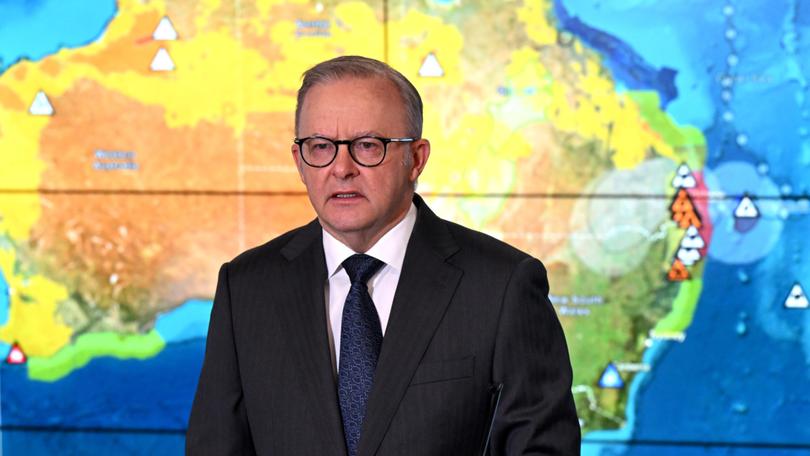Ex-cyclone Alfred forces Treasury officials to scramble to assess economic impact ahead of last-minute Budget

Federal Treasury is scrambling to assess the economic impact of ex-tropical cyclone Alfred as ministers overhaul their planned pre-election statement into a full-blown Budget to be handed down in just over two weeks.
Prime Minister Anthony Albanese, Treasurer Jim Chalmers and Finance Minister Katy Gallagher are preparing to battle to convince suburban voters that better economic times are on the way with the budget now set to be a springboard into a May election.
Another revenue increase — forecast by independent economist Chris Richardson to improve the budget bottom line by $11 billion — will give them wiggle room to offer more cost-of-living relief such as another round of rebates on power bills.
Sign up to The Nightly's newsletters.
Get the first look at the digital newspaper, curated daily stories and breaking headlines delivered to your inbox.
By continuing you agree to our Terms and Privacy Policy.Dr Chalmers says he’s readying for a “battle of the ‘burbs” against a Coalition opposition that is light on for economic policies.
“This will be won or lost in the outer suburbs, and that’s why it’s so important that we’ve tried to maintain this focus on the cost of living while the other guys have tried to drag us into culture wars and conflict,” he told the Labor-aligned John Curtin Research Centre’s podcast this week.
“It will be a battle of the ‘burbs and that means it will be about the economy. I hope it is, I’m spoiling for a fight on the economy. Nothing would make me happier than if this election was contested on the economy.”
But Alfred has blown away more than just the planned April 12 election date; the now ex-tropical cyclone and flooding it has brought to Brisbane, the Gold Coast and northern NSW will hit the economy too.
The Government’s economic team had already been looking at the impact of other natural disasters on the national economy as Alfred made its slow way towards the coast this week.
The floods in February and March 2022 shaved a quarter of a percentage point, or about $5 billion, off the national economy, drove up inflation because of the loss of fruit and vegetable crops, and cost more than $3.3 billion in insurance claims.
Mr Albanese on Saturday said the Government would assess the full impacts of Alfred in coming days.
“This will have an impact on the national economy, there’s no question about that,” he said..
“Already it’s having an impact. Businesses are closed, people are unable to go to work. The human impact is one thing; the environmental impact is significant but the economic impact is as well.”
Usually Treasury’s economic forecasts would be locked down this close to a Budget.
But its experts will monitor the longer-term effects from the disaster and feed those in to updated modelling as much as possible before the March 25 statement.
Any final decisions for the Budget — other than what to reveal on March 25 and what to save for an election campaign — will now revolve around recovery from the disaster.
One Coalition source with knowledge of Budget processes said they didn’t envy the task ahead of Dr Chalmers and Senator Gallagher to convert a pre-election economic statement to a full Budget.
Managing the inevitable landmines that were in any Budget was a very different job a month before an election compared to a month after one, they said.
Last week’s national accounts showed the economy grew 0.6 per cent in the December quarter and 1.3 per cent for the year, coming in above expectations.
The data also showed the standing of households improved marginally — the first time in two years GDP per capita has been in positive territory.
Government insiders are hopeful the economic improvement combined with last month’s interest rate cut, sustained low inflation levels and low unemployment will ease the pressure on Australians and show Labor’s management has led to the economy turning the corner while avoiding recession.
Mr Richardson has predicted a $13 billion increase to the tax take this financial year compared with Treasury’s December forecast, with more people in work resulting in higher personal income tax payments.
Company taxes are also expected to outperform thanks to prices of Australia’s key exports again falling slower than Treasury’s conservative estimates and a weaker Australian dollar boosting mining profits.
But indirect taxes, like the ones we charge on spending, are tipped to be $1.5 billion less than forecast.
“Once again a key reason is that we don’t enforce our tobacco taxes, for reasons found in the dictionary under the word ‘stupid’,” Mr Richardson said.
Despite the fiscal improvement, the Budget is still expected to be in the red to the tune of $16 billion in 2024-25.
Originally published on The Nightly

